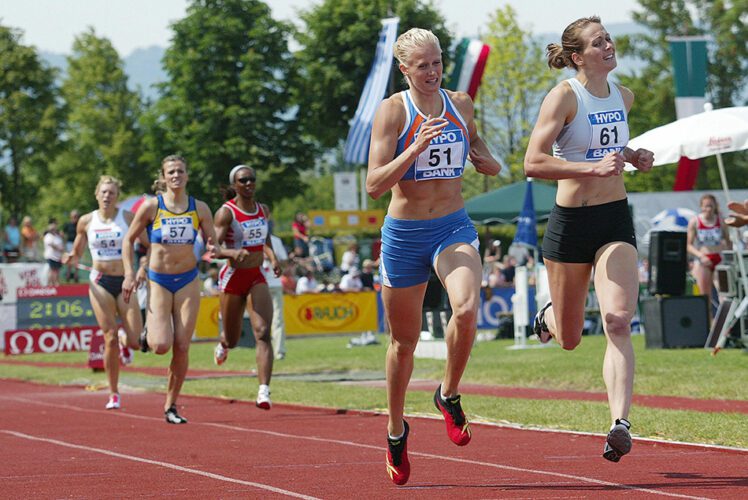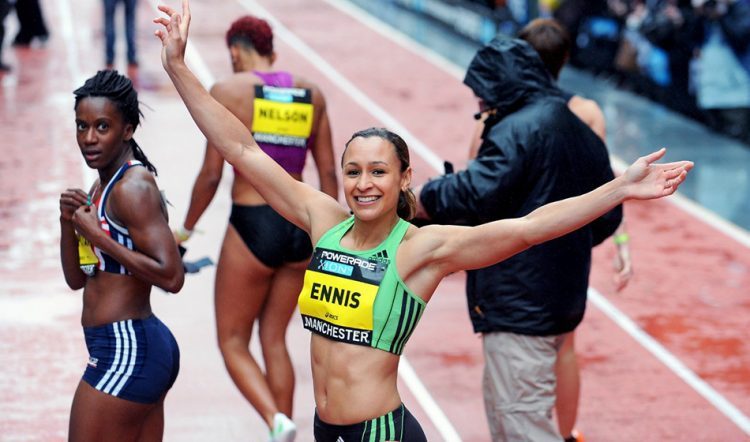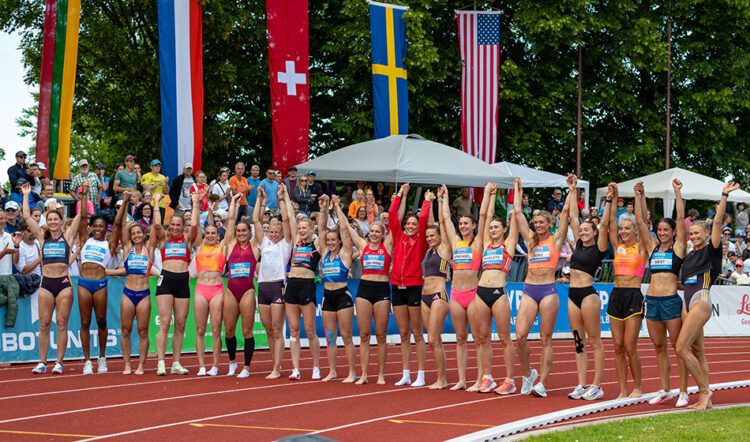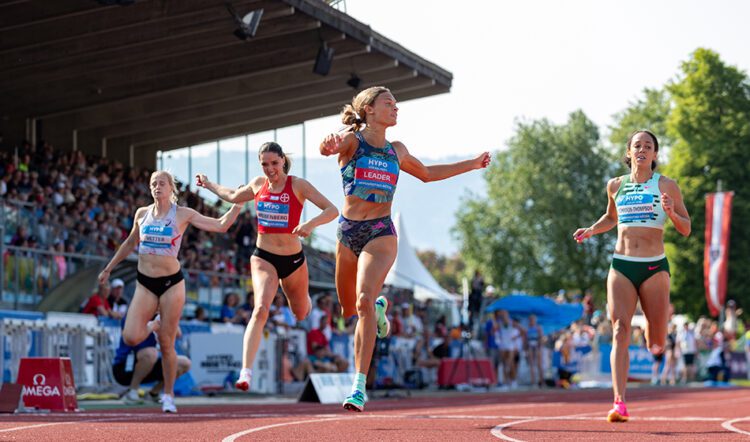As it prepares to celebrate its 50th anniversary, Gabriella Pieraccini looks at the rich history of the Götzis Hypomeeting in Austria
“A good old-fashioned wallow in nostalgia,” my editor mused, as we pondered how best to set the scene for the 50th anniversary of the Götzis Hypomeeting at the end of May. “The roll of honour. Some pointers on how influential it’s been through the years. Can you do 1500 words?” Some writing and gorgeous wallowing on 100 days of world-class athletics? Count me in.
Celebrating the history
Götzis is, without doubt, the finest track and field meeting anywhere in the world. The pages of this, and many other, athletics publications are rich with gushing praise of the gold standard set year after year by the organisers. The fan experience, the athlete experience, the media experience, the coach experience. Simple athletics, done beautifully.
The Götzis Hypomeeting has taken place every year since 1975, save for the Covid-ravaged season of 2020. For the 50th anniversary edition, the usual celebrations have been gilded accordingly. Special invitations have been extended to those who won multiple editions of the competition, as well as one-off winners who went on to win a world or Olympic title.
The most prolific of all the multiple winners is the 2021 Olympic champion Damian Warner of Canada, who has been the victor no fewer than eight times, and six times in a row between 2016 and 2022. His most recent streak was broken in 2023 by compatriot Pierce LePage, who went on to win the world title in Budapest that year.
Czechia’s Roman Šebrle is a five-time winner, and in 2001 in Götzis he became the first man to ever score over 9000 points, a feat only achieved since by three others – Ashton Eaton, Kevin Mayer and Warner.
Great Britain’s Daley Thompson won the title twice, in 1980 and 1982, setting world records on both occasions. Sweden’s 2004 Olympic champion Carolina Klüft won in Götzis five times between 2003 and 2007, and Jane Frederick of the USA won five times between 1978 and 1985, straddling the evolution from pentathlon to heptathlon. Anke Behmer, representing the German Democratic Republic, won in the three years leading up to the fall of the Berlin wall in 1989, and passed the baton to Sabine Braun to win for Germany in the three years afterwards.

The 2012 Olympic champion Jessica Ennis-Hill took the title in Götzis in 2010, 2011 and 2012, while double world champion Katarina Johnson-Thompson won in 2014 and 2019 and triple Olympic champion Nafissatou Thiam won in 2017 and 2018.
The last time anyone who wasn’t a Canadian won the decathlon was Kai Kazmirek of Germany in 2015, who retired from the sport this year. Canada won both men’s and women’s titles in 2016, Brianne Theisen Eaton overlapping in her third victory with Damian Warner’s second.

Robert Zmelik of Czechia, who won in 1992, holds the world best for the one-hour decathlon (7897, compared to his “normal” decathlon PB of 8627). Eduard Hämäläinen, who won three times in the mid-nineties, is an athlete to retain for trivia purposes, having competed in three different world championships representing a different country each time – the Soviet Union, Belarus and Finland. Andrei Krauchanka of Belarus won in 2007, and in recent years has been a leading sporting figure speaking out against the current political regime in his native country.
The 2023 “Rookie of the Year” title was won by Sander Skotheim of Norway, who claimed European and world gold indoors this season, along with breaking Kevin Mayer’s European heptathlon record. Ash Moloney, Rico Freimuth, Leonel Suarez, Sofie Dokter, Henriette Jaeger, Nadine Visser and Dafne Schippers were all former rookies of their year. In 2024 Great Britain’s Abi Pawlett won that honour on her Götzis debut.
The list of famous winners goes on. Trey Hardee. Bryan Clay. Dmitry Karpov. Erki Nool. Michael Smith. Christian Plaziat. Siggi Wentz. Christian Schenk. Guido Kratschmer. Natalya Dobrynska. Eunice Barber. Denise Lewis. Ghada Shouaa. Jackie Joyner Kersee. Anna Hall. The careers of champions born, consolidated, and celebrated in a small, unassuming town in the westernmost corner of Austria.
A festival of combined events
Götzis is a golden thread running through the modern history of combined events, weaving dominant all-time greats together with memorable individual performances and personalities.
There are too few words at our disposal here to capture the full history of Götzis, but happily there will be special merchandise available onsite to commemorate the anniversary, including t-shirts listing all winners from the last 50 editions. The Museum of World Athletics (MOWA) will have a presence at the meeting for the first time, following the award of a heritage plaque to the event in 2019. The very first winners in 1975 – Petr Kratky, who won the inaugural decathlon title for Czechoslovakia, and Burglinde Pollak, who won the pentathlon title for DDR – have been invited to the weekend, too.
The celebrations will extend beyond the track and field. The traditional Friday night presentation (with accompanying beer garden) of the top ten competitors is moving to a new, open-air location, and will also include the superstars from years gone by.

The town will be transformed into a combined events festival – graffiti artworks promoting the 50th anniversary, benches printed with the Hypomeeting history, and big screens in the town centre for shoppers and café-goers to enjoy the action.
Within the stadium, we can expect the usual convivial atmosphere. The en masse declaration of “Ole!” in response to the curlicue of trumpet fanfare which announces every one of the ten decathlon, and seven heptathlon, disciplines over two days. The grassy vantage points, from which the action can be followed over the edge of a frosted stein of Mittel-European beer, while nibbling on a slab of lunchtime schnitzel.
There will be high jump and long jump features on the route from the entrance to the grandstand, demonstrating the stadium and world records, and helping new visitors understand the range of feats the multi-talented athletes in attendance can achieve. Event presentation is where Götzis really shines.

Telling the story
While Götzis and other major events gear up for the start of the main athletics season, Michael Johnson’s Grand Slam Track has been keeping us entertained. The series promised to be something fresh compared to current mainstream athletics formats, designed to reward athletes handsomely for their craft and leveraging the simplicity of track athletics into an attractive entertainment product. However, amongst all the hoopla, something familiar caught the eye of the attendant commentators and analysts.
As the athletes worked their way through the multiple events in their cluster, the notion of collecting points emerged as an engaging storyline. Whether Gabby Thomas’ domination of the 200m would be enough to help her win over the 400m expertise of Marileidy Paulino. Whether Ejgayehu Taye’s 5000m PB would be enough before the final event to allow her to hang on to the lead gained in an earlier event. Whether the precious points Kenny Bednarek picked up in the 100m would be significant for him against Oblique Seville in the 200m.
Swap those individual specialist names out and replace them with combined events athletes. The resulting narrative could be lifted from any combined events competition – at national, circuit, continental, or global level.
Within minutes, Grand Slam Track had discovered that combined events are engaging. That pitting athletes with different specialities against each other in multiple events over several days leads to fascinating competitions. That points and arithmetic are not too difficult to understand and, when presented with clear graphics, can inspire spirited debate about likely scenarios, and outcomes.

In the combined events, we have great sprinters like Damian Warner and Simon Ehammer. We have fabulous jumpers, like Sander Skotheim and young Jana Koščak. We have superb throwers, like Lindon Victor and Ireland’s new superstar, Kate O’Connor. And we have two-day competitions where the sprinters, jumpers and throwers can face each other in different events, and where fans can follow the progress of their favourite “racer”, “challenger” or equivalent to the emerging national treasure that is Vernon Norwood.
We have a devoted army of statisticians and analysts who can model scenarios based on season’s bests, PB series, “ideal” competitions, and any combination you could ever wish for. We have talented narrators who understand the dynamics of combined events, including how they differ from individual events, and can guide the viewer through the competition.
World Athletics will also have a presence in Götzis this month, seeking inspiration on how to make combined events more attractive for fans as part of their agenda on innovation. A good first step would be to introduce some rudimentary storytelling measures which, thanks to Grand Slam Track, there is now no excuse to overlook. But we are never more than a few steps away from a hasty WA council decision to solve a problem that has not yet been defined.
So, as we wallow in some good old-fashioned nostalgia, we must be mindful that tomorrow’s nostalgia is dependent on the memories we build today.
We know that our competition is not too long, too boring, or too difficult to understand, and we need only the most basic of measures – some scene-setting, some graphics and some knowledgeable narrators – to show that all that glitters in Götzis on its 50th anniversary, is indeed gold.
decathletesofeurope.co.uk
Götzis roll of honour
Decathlon
Year Name Nationality Pts
2024 Damian Warner CAN 8678
2023 Pierce LePage CAN 8700
2022 Damian Warner CAN 8797
2021 Damian Warner CAN 8995
2019 Damian Warner CAN 8711
2018 Damian Warner CAN 8795
2017 Damian Warner CAN 8591
2016 Damian Warner CAN 8523
2015 Kai Kazmirek GER 8462
2014 Trey Hardee USA 8518
2013 Damian Warner CAN 8307
2012 Hans Van Alphen BEL 8519
2011 Trey Hardee USA 8689
2010 Bryan Clay USA 8483
2009 Michael Schrader GER 8522
2008 Dmitriy Karpov KAZ 8504
2007 Andrei Krauchanka BLR 8617
2006 Bryan Clay USA 8677
2005 Roman Sebrle CZE 8534
2004 Roman Sebrle CZE 8842
2003 Roman Sebrle CZE 8807
2002 Roman Sebrle CZE 8800
2001 Roman Sebrle CZE 9026
2000 Tomas Dvorak CZE 8900
1999 Tomas Dvorak CZE 8738
1998 Erki Nool EST 8672
1997 Eduard Hämälainen FIN 8617
1996 Michael Smith CAN 8626
1995 Erki Nool EST 8575
1994 Eduard Hämälainen BLR 8735
1993 Eduard Hämälainen BLR 8604
1992 Robert Zmelik TCH 8627
1991 Michael Smith CAN 8427
1990 Christian Schenk DDR 8481
1989 Christian Plaziat FRA 8485
1988 Uwe Freimuth DDR 8381
1987 Siegfried Wentz BRD 8645
1986 Guido Kratschmer BRD 8519
1985 Uwe Freimuth DDR 8473
1984 Grigoriy Degtyaryov URS 8579
1983 Grigoriy Degtyaryov URS 8454
1982 Daley Thompson GBR 8704
1981 Sepp Zeilbauer AUT 8191
1980 Daley Thompson GBR 8622
1979 Thierry Dubois FRA 8161
1978 Guido Kratschmer BRD 8410
1977 Sepp Zeilbauer AUT 8063
1976 Guido Kratschmer BRD 8381
1975 Petr Kratky TCH 7591

Heptathlon
Year Name Nationality Pts
2024 Anouk Vetter NED 6642
2023 Anna Hall USA 6988
2022 Anouk Vetter NED 6693
2021 Xénia Krizsán HUN 6651
2019 Katarina Johnson-Thompson GBR 6813
2018 Nafissatou Thiam BEL 6806
2017 Nafissatou Thia BEL 7013
2016 Brianne Theisen Eaton CAN 6765
2015 Brianne Theisen Eaton CAN 6808
2014 Katarina Johnson-Thompsona GBR 6682
2013 Brianne Theisen CAN 6376
2012 Jessica Ennis GBR 6906
2011 Jessica Ennis GBR 6790
2010 Jessica Ennis GBR 6689
2009 Nataliya Dobrynska UKR 6558
2008 Tatyana Chernova RUS 6618
2007 Carolina Klüft SWE 6681
2006 Carolina Klüft SWE 6719
2005 Carolina Klüft SWE 6824
2004 Carolina Klüft SWE 6820
2003 Carolina Klüft SWE 6602
2002 Shelia Burell USA 6363
2001 Eunice Barber FRA 6736
2000 Eunice Barber FRA 6842
1999 DeDee Nathan USA 6577
1998 Irina Belova RUS 6466
1997 Denise Lewis GBR 6736
1996 Ghada Shouaa SYR 6942
1995 Ghada Shouaa SYR 6715
1994 Sabine Braun GER 6665
1993 Svetla Dimitrova BUL 6594
1992 Sabine Braun GER 6985
1991 Sabine Braun GER 6584
1990 Sabine Braun GER 6604
1989 Anke Behmer DDR 6686
1988 Anke Behmer DDR 6805
1987 Anke Behmer DDR 6692
1986 Jackie Joyner-Kersee USA 6841
1985 Jane Frederick USA 6666
1984 Nadeshda Vinogradova URS 6319
1983 Natalya Shubenkova URS 6526
1982 Jane Frederick USA 6423
1981 Jane Frederick USA 6308
1980* Yekaterina Smirnova URS 4677
1979* Jane Frederick USA 4708
1978* Jane Frederick USA 4651
1977* Diane Konihowski CAN 4639
1976* Diane Jones CAN 4641
1975* Burglinde Pollak DDR 4542
* 1975 – 1980: Pentathlon, from 1981: Heptathlon










